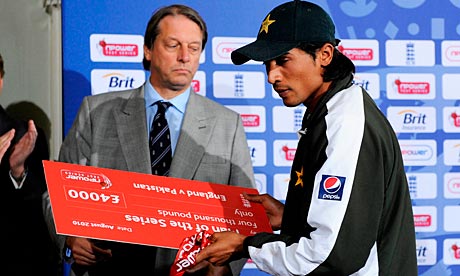Cricket's greed is a guilty habit that needs fixing
Cricket must dilute its own rampant gluttony and think harder about who it shakes hands with to avoid further murky episodes


Pakistan's Mohammad Amir receives his man of the series award from Giles Clarke. Photograph: Philip Brown/Reuters
An enduring image of the England versus Pakistan Test series last year was the sight of a visibly appalled Giles Clarke refusing to shake hands with Mohammad Amir – on the very day Amir was first exposed by a tabloid sting – while presenting his enduringly absurd man of the series award. Looking at the picture now the contrast between the pair is still striking: one a misguided naif who accepted large amounts of money from a charismatic older man and ended up shaming a cricketing nation when his sponsor was exposed as a crook; the other a corrupt Pakistani fast bowler.
This is, of course, just a helpful analogy. Clarke was guilty of no more than an error of judgment when he allowed English cricket to become entangled with Allen Stanford, the Texan adventurer who hid his activities so cleverly beneath the impenetrable disguise of a theatrically insincere quasi-messianic egomaniac in a hired helicopter. But the fact remains English cricket's chief executive has found himself face to face with two large-scale cricketing miscreants in recent times. Both have been brought to justice – but it would be misguided to believe that as a result the source of cricket's current soul-sickness has been lanced.
On the day of the spot-fixing sentences plenty of expert legal opinion was on offer. Darren Gough suggested two years in prison would be "a big ask for the three lads". Ian Botham, bellowingly in tune with the domestic zeitgeist, called for longer sentences and decreed: "It is Pakistan's problem. It's not ours." Botham is half right: prison was the right punishment, if only because of the need to establish aggressively the bulwark of deterrence. But he is wrong on another point. This isn't Pakistan's problem. It belongs to all of us and perhaps the quicker we accept this will decide how far the medicine dispensed at Southwark crown court is allowed to travel up the arm.
Most immediately there is the simple shared tragedy of the ruined careers of Amir and Mohammad Asif. Test Cricket exists as a spectacle of minutely refined talents and in Asif and Amir we have lost arguably the finest opening attack in the world. Much has been made of Amir's scurryingly vibrant talent, but Asif is also a master, a highly skilled slow-medium loper, the ball leaving his fingers infused with a snaking intelligence. Watching them in action was a joy and the sense of being cheated extends into this now decapitated pleasure. If you love cricket you will share a little of their punishment – albeit this is an aspect of the fall of the two Mo's few have felt like dwelling on.
There is a wider issue, though: one that looms above and beyond the "rogue dressing room" theory, or even Botham's rogue nation. Most obviously the real bad guys are still out there. The great spreading choking root structure of gambling fraud is still in place and we have simply blown the seeds from the top of a dandelion. But beyond this it is time to talk about something broader. It is time to talk about greed.
Cricket is currently seething with greed. Not just lassoed at the ankle with dimwit fixing scams, but convulsed higher up with ruinous institutional avarice. As Mr Justice Cooke remarked in his judgment, cricket "was once a game but is now a business" – and not a nice business either. At some point in the past decade the new breed of business-reared administrator decided this was how cricket must be now: prostrated before mammon, insatiably profit-driven, committed McDonald's-like to constant expansion as though this is all there will ever be of cricket and it's time to grab it all in great dripping handfuls of marketed crick-crap.
The Indian Premier League may be hoist here as a source of wider cultural contagion. This is no doubt unfair (it is so far untainted by illegal gambling), but the IPL is still an entity that trades on avarice, skewing cricket's internal gravity with its fiscal cult of yahooing brand-incantation and outsized personal enrichment for those who wear its advert-pyjamas. International cricket has also feasted gluttonously, cramming its calendar with the kind of humdrum multiplicity – a seven-match one‑day series, a triangular tournament – from which spot-fixing sprung. It is unintentionally hilarious that the guilty trio should have attempted the kind of scam that might have passed unobserved in a desultory Sharjah bore-fest but that was obvious in the glare of a Lord's Test. It's a bit like trying to pickpocket the Queen during her annual televised inspection of the entire Metropolitan police force, then wondering why you didn't get away with it.
Either way their crime cannot come as a surprise: not just because of the long-tolerated background whispers, but because it is coloured at the edges by aspects of cricket's wider culture. And so justice on this occasion should be passed, not with a gloating swish of the cane, but with sadness, and even perhaps a hand-wringing tinge of liberal guilt. This is a warning from the dock, a hint that cricket could perhaps think of reining itself in elsewhere, diluting its own rampant gluttony, thinking a little harder about who it shakes hands with generally – and sending out a message that at all times it is the game that is sacred, not its disorientating new riches.

0 Comments:
Post a Comment
Subscribe to Post Comments [Atom]
<< Home